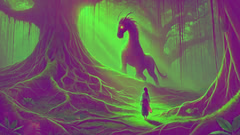Introduction
The forests of Luzon have long whispered with secrets. Beneath their emerald canopies, sunlight dapples through ancient trees, and wild orchids cling to mossy branches. Here, the air always feels heavy—alive with the scent of wet earth and the distant thrum of cicadas. To wander these woods is to journey through time itself, where each footfall treads upon a thousand unspoken tales. The elders of the land, wrinkled by years and wisdom, speak with reverence about these forests. They tell of creatures unseen, of guardians that watch from the shadows, and of paths that twist and coil back upon themselves if one dares enter without respect. Among all the legends spun by firelight, none stirs the imagination quite like that of the Tikbalang—a being both feared and revered, known to toy with travelers and weave illusions that lead the careless astray. With the head of a horse and the body of a towering man, the Tikbalang is said to stride silently through the mists, its mane glistening like woven moonbeams and its hooves never breaking a single twig. Parents caution their children to whisper a polite greeting before stepping into the trees and to always carry a sprig of ginger or salt as protection. Yet, for every warning, there are tales of brave souls who have crossed paths with the Tikbalang and returned with stories that defy belief. It is within this living labyrinth that our story unfolds—a tale of courage, cunning, and the thin line between the natural and the supernatural. For in the heart of the Philippine jungle, where the fog dances between trunks and the wind carries secrets, the Tikbalang waits, ever watchful, a test for all who enter the realm it calls home.
The Whispering Woods and Mayari’s Journey
Mayari had heard the stories since she was a child. She’d grown up in a village tucked between the foothills and the thick, wild jungle. The elders told her that the woods were alive, not just with birds and insects, but with spirits and creatures as old as the stones themselves. Every night, as the sun dipped behind the mountains, her grandmother would gather her and her cousins around the dying embers of a cooking fire. The old woman’s voice would drop to a hush as she spoke of lost travelers who had wandered into the forest at dusk, only to be led in circles for hours—sometimes days—by the Tikbalang. Some returned wide-eyed and silent. Others never returned at all.

Mayari had always listened with a mixture of fascination and skepticism. She was bold and clever, with sharp eyes and a mind that never settled for simple answers. The world was full of dangers, she knew, but it was also full of opportunities for those willing to face them. When her younger brother Lakan fell ill with a fever that wouldn’t break, Mayari decided to enter the forest herself. She’d heard that the roots of the balete tree—a gnarled giant deep within the woods—could be brewed into a potent medicine. No one in the village dared fetch it, for fear of angering the Tikbalang who was said to haunt the groves where balete trees grew thickest.
Armed with little more than a woven basket, a knife, and her grandmother’s old red scarf, Mayari set off at dawn. The air was cool and damp, filled with the scent of wild ginger and crushed leaves. Sunlight filtered down in shifting patterns as she followed a narrow trail winding ever deeper into the jungle. The trees loomed overhead, their branches tangled into a living roof. With every step, she felt the weight of unseen eyes pressing in from the shadows. Mayari recited a quiet greeting to the spirits as she’d been taught, touching the scarf at her neck for luck.
After an hour, the path faded into a tangle of undergrowth. Mayari pressed on, marking her way with strips of cloth torn from her scarf. She listened for birdsong—one of the few comforts in a forest that seemed to close around her—but the woods had gone strangely silent. The only sound was her own heartbeat, steady but quick. She was not afraid, she told herself. The stories were just stories.
But as the sun climbed higher, the shadows seemed to deepen. The air grew heavy and the silence thickened, as if the jungle were holding its breath. The trees around her twisted in strange shapes, roots curling like fingers from the dark soil. Mayari pressed forward until she spotted a clearing in the distance. In its center stood a towering balete tree, its roots snaking aboveground in thick ropes. She stepped into the light, her heart pounding, and knelt to dig at the base of the tree for the precious roots.
That’s when she heard it—a rustling in the ferns behind her, followed by the unmistakable thud of something heavy moving through the undergrowth. Mayari froze. Her fingers tightened around the handle of her knife. The tales she’d brushed aside now echoed in her mind: Do not look back if you hear the Tikbalang. Do not answer if it calls your name.
From the shadows at the edge of the clearing, a shape emerged: impossibly tall, with the head of a horse and eyes that glowed like embers in the half-light. Its mane shimmered with dew, and its limbs were long and sinewy, muscles rippling beneath skin the color of weathered bark. The Tikbalang watched her with a gaze that was both curious and ancient—neither friendly nor hostile, but filled with intelligence and challenge.
Mayari rose slowly, never breaking eye contact. She remembered her grandmother’s words: "The Tikbalang loves riddles and games. If you are clever, it may let you go." Gathering her courage, Mayari spoke. “Great one of the forest, I seek only healing for my brother. I bring respect and a promise not to harm your home.”
The creature’s ears flicked back. It circled her slowly, hooves silent on the mossy ground. Then, in a voice like wind through hollow logs, it replied: “Many enter these woods with wants. Few offer anything in return. What will you give for what you seek?”
Mayari thought quickly. She had nothing of great value, only her wits. “I will answer your riddle if you will let me take what I need. And if I fail, you may keep me in your forest forever.”
The Tikbalang’s lips curled in what might have been a smile. “Very well, child. Listen closely.”
Riddles and Illusions: The Tikbalang’s Challenge
The Tikbalang’s voice was like a gust of wind weaving through bamboo thickets: “I have cities but no houses, rivers without water, forests without trees, and mountains without stones. What am I?”

Mayari closed her eyes, letting her breath slow as she focused on the riddle. Her grandmother had loved riddles; she’d taught Mayari to find the patterns beneath the words. Cities but no houses… rivers but no water… Her mind raced through images: maps, dreams, illusions. Suddenly, it clicked. “You are a map,” she said, voice steady.
The Tikbalang’s eyes flashed with surprise and something like respect. “Clever child. You have won the right to take what you need. But know this: the forest is not tamed by riddles alone.”
Mayari knelt and dug carefully at the balete’s roots, her fingers brushing against the cool, white tendrils she’d sought. As she wrapped them in banana leaves for the journey home, the Tikbalang stepped forward, blocking her path. “A second riddle, for your safe passage,” it declared.
Mayari nodded, determination etched in her face. The creature intoned: “The more you take, the more you leave behind. What am I?”
She frowned, repeating the words under her breath. Her thoughts drifted to her trek through the forest—the way her feet pressed patterns into the damp earth. The answer came to her as a whisper: “Footsteps.”
The Tikbalang threw back its head and laughed—a sound that rumbled like distant thunder. “You are wise, Mayari of the village. Go now, but heed my warning: not all who pass through these woods are guided by kindness. There are things older and darker than even I.”
Mayari bowed in gratitude, clutching her prize. But as she turned to retrace her steps, she saw that the jungle had changed. The familiar trail was gone, replaced by thickets and twisted vines. The Tikbalang was nowhere to be seen. Panic fluttered in her chest; she remembered tales of travelers who walked for days in circles, trapped by Tikbalang illusions.
Steeling herself, Mayari tied another strip of scarf to a low branch and whispered a prayer to the spirits. She moved slowly, marking her way as best she could, but every landmark seemed to vanish as soon as she looked away. The sun dipped lower, casting long shadows across the forest floor. A cold mist crept through the trees, swirling around her legs. Shapes flickered in the corners of her eyes—figures that might have been animals, or might have been something else entirely.
Desperate for a way out, Mayari remembered a story her grandmother had told: If you wear your shirt inside out and walk backwards, the Tikbalang’s spell can be broken. She slipped off her blouse, reversed it, and tied it hastily around her torso. Then, glancing over her shoulder, she began to walk backwards along the path she hoped would lead home.
The mist thickened, muffling sound and swallowing light. Every step felt uncertain, but Mayari pressed on, refusing to yield to fear. Time lost all meaning in that shrouded world. At last, she heard a distant sound—the clanging of a gong from her village, calling workers home for supper. She stumbled forward, breaking through a wall of ferns into the familiar fields just beyond the forest’s edge.
The sun was setting in a blaze of gold and crimson. Villagers rushed to her side, marveling at her return. Mayari handed the balete roots to her grandmother, who brewed them into a tea that cured Lakan’s fever by dawn.
That night, as she lay beneath a mosquito net, Mayari listened to the wind whispering through the bamboo walls. In her dreams, the Tikbalang appeared once more—not as a monster, but as a guardian, watching over the forest with ancient eyes.
The Pact and the Path: Tikbalang’s True Nature Revealed
Word of Mayari’s courage spread quickly through the village and beyond. Some called her foolish for tempting fate, others hailed her as a hero. But Mayari herself felt changed—not just by the danger she had faced, but by what she’d learned about the nature of the Tikbalang and the forest it protected.

In the days that followed, the village saw subtle shifts. The river ran clearer. The fields yielded more rice than ever before. Birds returned in flocks to the groves, filling the dawn with song. The elders whispered that Mayari must have pleased the Tikbalang, who now watched over their land more kindly.
Curious and grateful, Mayari ventured again to the forest’s edge—this time bringing offerings: woven garlands, a jar of sweet honey, and a song she sang softly under her breath. She did not enter too far, but stood beneath the shade of a towering narra tree, speaking words of thanks to whatever spirits might be listening.
As months passed, Mayari’s connection to the woods deepened. She learned to read signs in the leaves and clouds, to sense when rain would come or when wild pigs would wander near. The villagers came to her for guidance, and she became both healer and storyteller, weaving lessons from her encounter into every tale she told.
But one evening, as storm clouds gathered and wind rattled the bamboo walls of her hut, Mayari heard a strange sound—a whinny carried on the wind, mingling with the crash of distant thunder. She stepped outside, heart pounding. The path to the forest was lit by flickers of lightning, revealing fleeting glimpses of tall grass bending in the gale.
At the edge of the woods, the Tikbalang waited. Its eyes glimmered with purpose, and this time, its form seemed less imposing—more a part of the world than apart from it.
"You kept your word," it rumbled, voice blending with the wind and rain. "Now I will keep mine. The forest will protect your people as long as you honor its ways. But remember: what is given can also be taken away."
Mayari nodded, understanding at last that the Tikbalang was not merely a trickster or a terror—it was a guardian, a spirit bound to the land and its balance. The pact they’d forged would last as long as respect for nature endured in their hearts.
In the years that followed, Mayari grew old and wise. She taught each generation how to move gently through the world, how to greet the spirits of river and root, and how to listen when the wind carried strange sounds through the bamboo groves. And sometimes—when the mists were thickest and the moon hung low—she’d glimpse the Tikbalang watching from beneath the balete trees, its eyes full of secrets and memories older than memory itself.
Conclusion
Even today, villagers in Luzon teach their children to show respect when entering the forest—to whisper greetings and offer small tokens to unseen guardians. They say that if you lose your way among the twisting paths and shifting shadows, you might catch a glimpse of hooves or hear a laughter not quite human. The Tikbalang remains a symbol of the wildness that endures at the edge of civilization: mischievous yet watchful, demanding humility from those who would pass through its realm. Mayari’s story lives on, not only as a warning but as an invitation—to listen, to learn, and to remember that every place has its spirits and every journey its tests. In honoring these old bonds between people and nature, communities find protection and belonging, even as the world changes around them. For as long as there are forests in the Philippines, and as long as moonlight filters through the balete trees, the Tikbalang will remain—a keeper of secrets, a teacher of respect, and a reminder that magic waits just beyond the familiar path.













